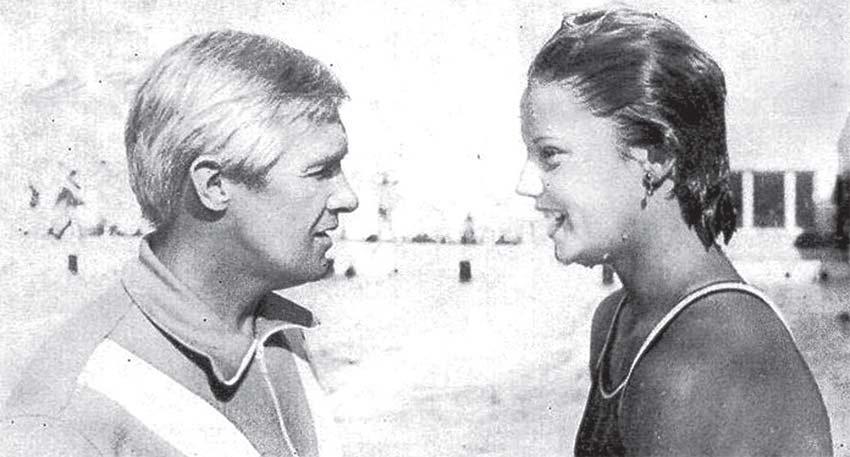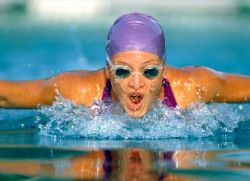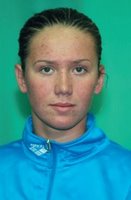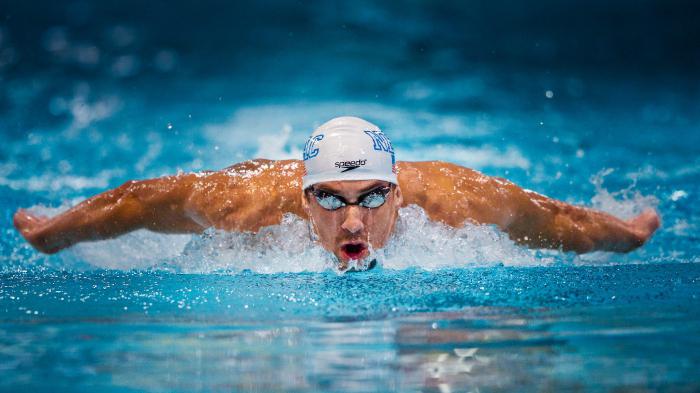Дендеберова, Елена Юрьевна. Дендеберова елена плавание
Дендеберова, Елена Юрьевна - Howling Pixel
Елена Юрьевна Дендеберова (4 мая 1969, Ленинград, РСФСР, СССР) — советская пловчиха, призёр Олимпийских игр, чемпионатов мира и Европы. Заслуженный мастер спорта СССР (1984). Специализировалась в комплексном плавании и плавании вольным стилем. Тренер — заслуженный тренер СССР Г. Г. Петров[1].
Спортивные результаты
- 2-й призёр XXIV Олимпийских игр (1988) дистанция 200 м, комплексное плавание.
- Участница XXIV Олимпийских игр (1992) — 4 место.
- 2-й призёр чемпионата мира (1986).
- Чемпионка Европы (1985).
- 2-кратный призёр первенств Европы (1985, 1987).
- 4-кратная победительница Кубка Европы (1983—1985).
- 2-кратный призёр розыгрыша Кубка Европы (1983—1985).
- Чемпионка международных соревнований «Дружба-84».
- 55-кратная чемпионка СССР (1984—1992)
- Многократный призёр первенств СССР.
- Установила много рекордов страны.
- Юношеский рекорд России на дистанции 200 м комплексным плаванием, установленный ей в 1984 году, не побит по состоянию на 10 мая 2018 года
- Юношеский рекорд России на дистанции 400 м комплексным плаванием, установленный ей в 1984 году, не побит по состоянию на 10 мая 2018 года
На Олимпийских играх 1988 года в Сеуле выиграла серебро на дистанции 200 м комплексным плаванием, уступив только Даниеле Хунгер из ГДР. Ей же Дендеберова уступила в борьбе за бронзу на дистанции 400 м комплексом на Олимпиаде-1988 и 200 м комплексом на Олимпиаде-1992.
Примечания
- ↑ Петров Глеб Георгиевич – отмечает 75-летие! | Всероссийская Федерация Плавания. www.russwimming.ru. Проверено 13 сентября 2017.
Ссылки
http://staff.lesgaft.spb.ru/648 (недоступная ссылка)
This page is based on a Wikipedia article written by authors (here). Text is available under the CC BY-SA 3.0 license; additional terms may apply. Images, videos and audio are available under their respective licenses.
howlingpixel.com
Дендеберова, Елена Юрьевна - WikiVisually
1. Союз Советских Социалистических Республик – The Soviet Union, officially the Union of Soviet Socialist Republics was a socialist state in Eurasia that existed from 1922 to 1991. It was nominally a union of national republics, but its government. The Soviet Union had its roots in the October Revolution of 1917 and this established the Russian Socialist Federative Soviet Republic and started the Russian Civil War between the revolutionary Reds and the counter-revolutionary Whites. In 1922, the communists were victorious, forming the Soviet Union with the unification of the Russian, Transcaucasian, Ukrainian, following Lenins death in 1924, a collective leadership and a brief power struggle, Joseph Stalin came to power in the mid-1920s. Stalin suppressed all opposition to his rule, committed the state ideology to Marxism–Leninism. As a result, the country underwent a period of rapid industrialization and collectivization which laid the foundation for its victory in World War II and postwar dominance of Eastern Europe. Shortly before World War II, Stalin signed the Molotov–Ribbentrop Pact agreeing to non-aggression with Nazi Germany, in June 1941, the Germans invaded the Soviet Union, opening the largest and bloodiest theater of war in history. Soviet war casualties accounted for the highest proportion of the conflict in the effort of acquiring the upper hand over Axis forces at battles such as Stalingrad. Soviet forces eventually captured Berlin in 1945, the territory overtaken by the Red Army became satellite states of the Eastern Bloc. The Cold War emerged by 1947 as the Soviet bloc confronted the Western states that united in the North Atlantic Treaty Organization in 1949. Following Stalins death in 1953, a period of political and economic liberalization, known as de-Stalinization and Khrushchevs Thaw, the country developed rapidly, as millions of peasants were moved into industrialized cities. The USSR took a lead in the Space Race with Sputnik 1, the first ever satellite, and Vostok 1. In the 1970s, there was a brief détente of relations with the United States, the war drained economic resources and was matched by an escalation of American military aid to Mujahideen fighters. In the mid-1980s, the last Soviet leader, Mikhail Gorbachev, sought to reform and liberalize the economy through his policies of glasnost. The goal was to preserve the Communist Party while reversing the economic stagnation, the Cold War ended during his tenure, and in 1989 Soviet satellite countries in Eastern Europe overthrew their respective communist regimes. This led to the rise of strong nationalist and separatist movements inside the USSR as well, in August 1991, a coup détat was attempted by Communist Party hardliners. It failed, with Russian President Boris Yeltsin playing a role in facing down the coup. On 25 December 1991, Gorbachev resigned and the twelve constituent republics emerged from the dissolution of the Soviet Union as independent post-Soviet states
2. Плавание – Swimming is an individual or team sport that involves using arms and legs to move the body through water. Typically, the takes place in pools or in open-water. Competitive swimming is one of the most popular Olympic sports, with events in butterfly, backstroke, breaststroke, freestyle, in addition to these individual events, swimmers also take part in relays. Swimming each stroke requires specific techniques, and in competition, there are specific regulations concerning the form for different strokes. There are also put in place to regulate what types of swimsuits are allowed at competitions. Although it is possible for competitive swimmers to incur several injuries from the sport, evidence of recreational swimming in prehistoric times has been found, with the earliest evidence dating to Stone Age paintings from around 10000 years ago. Written references date from 2000 BC, with some of the earliest references to swimming including the Iliad, the Odyssey, the Bible, Beowulf, the Quran and others. In 1538, Nikolaus Wynmann, a German professor of languages, wrote the first swimming book, Swimming emerged as a competitive recreational activity in the 1830s in England. In 1828, the first indoor swimming pool, St Georges Baths was opened to the public, by 1837, the National Swimming Society was holding regular swimming competitions in six artificial swimming pools, built around London. In 1844 two Native American participants at a competition in London introduced the front crawl to a European audience. Sir John Arthur Trudgen picked up the stroke from some South American natives and successfully debuted the new stroke in 1873. His stroke is still regarded as the most powerful to use today, captain Matthew Webb was the first man to swim the English Channel, in 1875. Using the breaststroke technique, he swam the channel 21.26 miles in 21 hours and 45 minutes and his feat was not replicated or surpassed for the next 36 years, until T. W. Burgess made the crossing in 1911. Other European countries also established swimming federations, Germany in 1882, France in 1890, the first European amateur swimming competitions were in 1889 in Vienna. The worlds first womens swimming championship was held in Scotland in 1892, mens swimming became part of the first modern Olympic Games in 1896 in Athens. In 1902, the Australian Richmond Cavill introduced the front crawl to the Western world, in 1908, the world swimming association, Fédération Internationale de Natation, was formed. Womens swimming was introduced into the Olympics in 1912, the first international tournament for women outside the Olympics was the 1922 Womens Olympiad, Butterfly was developed in the 1930s and was at first a variant of breaststroke, until it was accepted as a separate style in 1952. Competitive swimming became popular in the 19th century, the goal of competitive swimming is to break personal or world records while beating competitors in any given event
3. Санкт-Петербург – Saint Petersburg is Russias second-largest city after Moscow, with five million inhabitants in 2012, and an important Russian port on the Baltic Sea. It is politically incorporated as a federal subject, situated on the Neva River, at the head of the Gulf of Finland on the Baltic Sea, it was founded by Tsar Peter the Great on May 271703. In 1914, the name was changed from Saint Petersburg to Petrograd, in 1924 to Leningrad, between 1713 and 1728 and 1732–1918, Saint Petersburg was the capital of imperial Russia. In 1918, the government bodies moved to Moscow. Saint Petersburg is one of the cities of Russia, as well as its cultural capital. The Historic Centre of Saint Petersburg and Related Groups of Monuments constitute a UNESCO World Heritage Site, Saint Petersburg is home to The Hermitage, one of the largest art museums in the world. A large number of consulates, international corporations, banks. Swedish colonists built Nyenskans, a fortress, at the mouth of the Neva River in 1611, in a then called Ingermanland. A small town called Nyen grew up around it, Peter the Great was interested in seafaring and maritime affairs, and he intended to have Russia gain a seaport in order to be able to trade with other maritime nations. He needed a better seaport than Arkhangelsk, which was on the White Sea to the north, on May 1703121703, during the Great Northern War, Peter the Great captured Nyenskans, and soon replaced the fortress. On May 271703, closer to the estuary 5 km inland from the gulf), on Zayachy Island, he laid down the Peter and Paul Fortress, which became the first brick and stone building of the new city. The city was built by conscripted peasants from all over Russia, tens of thousands of serfs died building the city. Later, the city became the centre of the Saint Petersburg Governorate, Peter moved the capital from Moscow to Saint Petersburg in 1712,9 years before the Treaty of Nystad of 1721 ended the war, he referred to Saint Petersburg as the capital as early as 1704. During its first few years, the city developed around Trinity Square on the bank of the Neva, near the Peter. However, Saint Petersburg soon started to be built out according to a plan, by 1716 the Swiss Italian Domenico Trezzini had elaborated a project whereby the city centre would be located on Vasilyevsky Island and shaped by a rectangular grid of canals. The project was not completed, but is evident in the layout of the streets, in 1716, Peter the Great appointed French Jean-Baptiste Alexandre Le Blond as the chief architect of Saint Petersburg. In 1724 the Academy of Sciences, University and Academic Gymnasium were established in Saint Petersburg by Peter the Great, in 1725, Peter died at the age of fifty-two. His endeavours to modernize Russia had met opposition from the Russian nobility—resulting in several attempts on his life
4. Российская Советская Федеративная Социалистическая Республика – The Republic comprised sixteen autonomous republics, five autonomous oblasts, ten autonomous okrugs, six krais, and forty oblasts. Russians formed the largest ethnic group, the capital of the Russian SFSR was Moscow and the other major urban centers included Leningrad, Novosibirsk, Yekaterinburg, Nizhny Novgorod and Samara. The Russian Soviet Republic was proclaimed on November 7,1917 as a sovereign state, the first Constitution was adopted in 1918. In 1922 the Russian SFSR signed the Treaty on the Creation of the USSR, the economy of Russia became heavily industrialized, accounting for about two-thirds of the electricity produced in the USSR. It was, by 1961, the third largest producer of petroleum due to new discoveries in the Volga-Urals region and Siberia, trailing only the United States and Saudi Arabia. In 1974, there were 475 institutes of education in the republic providing education in 47 languages to some 23,941,000 students. A network of territorially organized public-health services provided health care, the effects of market policies led to the failure of many enterprises and total instability by 1990. On June 12,1990, the Congress of Peoples Deputies adopted the Declaration of State Sovereignty, on June 12,1991, Boris Yeltsin was elected the first President. On December 8,1991, heads of Russia, Ukraine, the agreement declared dissolution of the USSR by its founder states and established the Commonwealth of Independent States. On December 12, the agreement was ratified by the Russian Parliament, therefore Russian SFSR denounced the Treaty on the Creation of the USSR and de facto declared Russias independence from the USSR. On December 25,1991, following the resignation of Mikhail Gorbachev as president of the Soviet Union, on December 26,1991, the USSR was self-dissolved by the Soviet of Nationalities, which by that time was the only functioning house of the Supreme Soviet. After dissolution of the USSR, Russia declared that it assumed the rights and obligations of the dissolved central Soviet government, the new Russian constitution, adopted on December 12,1993 after a constitutional crisis, abolished the Soviet system of government in its entirety. Initially, the state did not have a name and wasnt recognized by neighboring countries for five months. Meanwhile, anti-Bolsheviks coined the mocking label Sovdepia for the nascent state of the Soviets of Workers, on January 25,1918 the third meeting of the All-Russian Congress of Soviets renamed the unrecognized state the Soviet Russian Republic. The Treaty of Brest-Litovsk was signed on March 3,1918, on July 10,1918, the Russian Constitution of 1918 renamed the country the Russian Socialist Federative Soviet Republic. By 1918, during the Russian Civil War, several states within the former Russian Empire seceded, internationally, in 1920, the RSFSR was recognized as an independent state only by Estonia, Finland, Latvia and Lithuania in the Treaty of Tartu and by the short-lived Irish Republic. On December 30,1922, with the creation of the Soviet Union, the final Soviet name for the republic, the Russian Soviet Federative Socialist Republic, was adopted in the Soviet Constitution of 1936. By that time, Soviet Russia had gained roughly the same borders of the old Tsardom of Russia before the Great Northern War of 1700
5. Медаль «За трудовую доблесть» – It was established on December 27,1938 by decree of the Presidium of the Supreme Soviet of the USSR. During its existence of just over fifty years, it was bestowed to almost two million deserving citizens, the medal ceased to be awarded following the December 1991 dissolution of the Soviet Union. The Medal For Labour Valour was worn on the side of the chest and in the presence of other medals of the USSR. If worn in the presence of awards of the Russian Federation, the Medal For Labour Valour was a 34 mm in diameter circular medal struck from.925 silver with a raised rim on both sides. In the upper obverse, a ruby-red enamelled 19.2 mm wide five pointed star with a silver hammer and sickle at its center. Below the star, the inscription in two rows of sunken and red enamelled 2.8 mm high letters FOR VALOUR LABOUR, at the very bottom, the relief inscription in 3.3 mm high letters USSR. On the otherwise plain reverse, the inscription on two rows of 2.5 mm high letters LABOUR IN THE USSR - A MATTER OF HONOUR. Early awards hung from a small triangular mount covered with a red ribbon with a threaded stub, the individuals below were recipients of the Medal For Labour Valour
6. Летние Олимпийские игры – The Summer Olympic Games or the Games of the Olympiad, first held in 1896, is an international multi-sport event that is hosted by a different city every four years. The most recent Olympics were held in Rio de Janeiro, Brazil, the International Olympic Committee organizes the games and oversees the host citys preparations. In each Olympic event, gold medals are awarded for first place, silver medals are awarded for second place, and bronze medals are awarded for third, the Winter Olympic Games were created due to the success of the Summer Olympics. The Olympics have increased in scope from a 42-event competition with fewer than 250 male competitors from 14 nations in 1896 to 302 events with 10,768 competitors from 204 nations in 2012, eighteen countries have hosted the Summer Olympics. The United States has hosted four Summer Olympics, more than any other nation, four cities have hosted two Summer Olympics, Athens, Paris, Los Angeles, and Tokyo. Tokyo is the first city outside of the Western world to host the Summer Olympics multiple times, asia has hosted the Summer Olympics four times in Japan, South Korea, and China. The only Summer Olympics held in the Southern Hemisphere have been in Australia, the 2016 Games are the first Summer Olympics to be held in South America and the first to be held during the local winter season. Africa has yet to host a Summer Olympics, only five countries—Greece, Australia, France, Great Britain, and Switzerland—have been represented at every Summer Olympic Games. The only country to have won at least one medal at every Summer Olympic Games is Great Britain. The United States leads the medal table. Qualification rules for each of the Olympic sports are set by the International Sports Federations that governs that sports international competition, for individual sports, competitors typically qualify through attaining a certain place in a major international event or on the IFs ranking list. There is a rule that maximum three individual athletes may represent each nation per competition. Nations most often qualify teams for team sports through continental qualifying tournaments, each nation may be represented by no more than one team per competition a team is two people in some sports. The United States has hosted four Summer Olympic Games, more than any other nation, the United Kingdom hosted the 2012 Olympic Games, its third Summer Olympic Games, in its capital London, making London the first city to host the Summer Olympic Games three times. Australia, France, Germany, Greece, and Japan have all hosted the Summer Olympic Games twice. Other countries that have hosted the Summer Olympics are Belgium, Brazil, China, Canada, Finland, Italy, Mexico, Netherlands, South Korea, Spain, the Soviet Union, asia has hosted the Summer Olympics three times and will host again in 2020. In 2016, Rio de Janeiro hosted the first Summer Olympics in South America, three cities have hosted two Summer Olympic Games, Los Angeles, Paris, and Athens. Stockholm has hosted events at two Summer Olympic Games, having hosted the games in 1912 and the events at the 1956 Summer Olympics—which they are usually listed as jointly hosting
7. Летние Олимпийские игры 1988 – The 1988 Summer Olympics, officially known as the Games of the XXIV Olympiad, were an international multi-sport event celebrated from 17 September to 2 October 1988 in Seoul, South Korea. They were the second summer Olympic Games to be held in Asia, in the Seoul Games,159 nations were represented by a total of 8,391 athletes,6,197 men and 2,194 women. 263 events were held and 27,221 volunteers helped to prepare the Olympics,11,331 media showed the Games all over the world. These were the last Olympic Games for two of the worlds dominating sport powers, the Soviet Union and East Germany, as both ceased to exist before the next Olympic Games. North Korea, still officially at war with South Korea, and its allies, Albania, Ethiopia, Cuba, Madagascar, Nicaragua boycotted the games because of the U. S. military support to the Contra rebels. However, the much larger boycotts seen in the previous three Summer Olympics were avoided, resulting in the largest ever number of participating nations during the Cold War era, before the opening of the games, thousands of homeless were captured by the police and sent to work camps. Several died under torture. ′ Seoul was chosen to host the Summer Games through a vote held on 30 September 1981, below was the vote count that occurred at the 84th IOC Session and 11th Olympic Congress in Baden-Baden, West Germany. After the Olympics were awarded, Seoul also received the opportunity to stage the 10th Asian Games in 1986, Soviet Vladimir Artemov won four gold medals in gymnastics. Daniela Silivaş of Romania won three and equalled compatriot Nadia Comănecis record of seven Perfect 10s in one Olympic Games, to these medals, she added a gold in the 4×100 relay and a silver in the 4×400. Just after the Games, she announced her retirement, Canadian Ben Johnson won the 100 m final with a new world record, but was disqualified after he tested positive for stanozolol. Johnson has since claimed that his positive test was the result of sabotage, the US finishes in fourth place after the completion of the optional rounds with a combined score of 390.575, three tenths of a point behind the German Democratic Republic. The USSR won their team gold medals in artistic gymnastics on both the mens and womens sides with scores of 593.350 and 395.475 respectively. The mens team was led by Vladimir Artemov, while Elena Shushunova lead the womens team, lawrence Lemieux, a Canadian sailor in the Finn class, was in second place and poised to win a silver medal when he abandoned the race to save an injured competitor. He arrived in 21st place, but was recognized by the IOC with the Pierre de Coubertin medal honoring his bravery and sacrifice. U. S. diver Greg Louganis won back-to-back titles on both diving events, but only hitting the springboard with his head in the 3 m event final. This became a minor controversy years later when Louganis revealed he knew he was HIV-positive at the time, since HIV cannot survive in open water, no other divers were ever in danger. Christa Luding-Rothenburger of East Germany became the first athlete to win Olympic medals at the Winter Olympics and she added a cycling silver to the speed skating gold she won earlier in the Winter Olympics of that year in Calgary. Swimmer Kristin Otto of East Germany won six gold medals, other multi-medalists in the pool were Matt Biondi and Janet Evans
8. Игры доброй воли – The Goodwill Games was an international sports competition created by Ted Turner in reaction to the political troubles surrounding the Olympic Games of the 1980s. Like the Olympics, the Goodwill Games were held four years. The Summer Goodwill Games occurred five times, between 1986 and 2001, while the Winter Goodwill Games occurred only once, in 2000 and they were cancelled by Time Warner, which had bought ownership of them in 1996, due to low television ratings. The first Games, held in Moscow in 1986, featured 182 events, world records were set by Sergey Bubka, Jackie Joyner-Kersee, and both the men and womens 200 m cycle racing, by East Germanys Michael Hübner and the Soviet Unions Erika Salumäe, respectively. World records also fell at the 1990 Games in Seattle, to Mike Barrowman in the 200 m breaststroke, the 1994 Games were held in Saint Petersburg, Russia, in the first competition since the Soviet Union had been replaced by fifteen independent republics. The games were bought from Ted Turner by Time Warner in 1996 when Time Warner acquired his company, Time Warner organized the 2001 Games in Brisbane, Australia, before announcing that this would be the last edition of the games. The 2001 edition witnessed Australia win the most medals with 75, nevertheless, critics praised Turner Network Television for showing the games live, rather than on tape delay
9. Игры доброй воли 1986 – The 1986 Goodwill Games was the inaugural edition of the international multi-sport event created by Ted Turner, which was held from 5 –20 July 1986. The main stadium was the Central Lenin Stadium in Moscow, Soviet Union, the Soviet athletes dominated the competition, winning 118 gold medals and 241 medals overall. The United States finished second place, with 42 golds and 142 medals in total, a total of 3000 athletes from 79 nations took part in events in eighteen different sports. The Goodwill Games was the first time in years that elite athletes from Soviet Union. In contrast to the methods of other major competitions, the Games was an invitation-only event. The event was broadcast over 129 hours on TBS in the United States, the Games themselves were subject to political issues, as the United States Defense Department banned 12 American athletes from competing as they were serving military personnel. The USSR also banned teams from Israel and South Korea from the competition, the Goodwill Games, although commercial in nature, were not successful financially and Turner Broadcasting suffered millions of dollars of losses through its support of the event. A number of sporting world records were set over the course of the Games, vladimir Salnikov broke the 800 m freestyle world record in the swimming competition with a time of 7,50.64. In the cycling events, Michael Hübner and Erika Salumäe set world records in the mens and womens 200 m flying start race, respectively. The 1986 FIBA World Basketball Championship in Madrid was broadcast on Ted Turners network and were classified as the official Goodwill Games event for the mens sport. In the womens competition, the United States team broke the Soviets undefeated international run. The 1986 Games also saw the first ever international motorcycle polo, or motoball, competition
10. Олимпийские игры – The Olympic Games are considered the worlds foremost sports competition with more than 200 nations participating. The Olympic Games are held four years, with the Summer and Winter Games alternating by occurring every four years. Their creation was inspired by the ancient Olympic Games, which were held in Olympia, Greece, Baron Pierre de Coubertin founded the International Olympic Committee in 1894, leading to the first modern Games in Athens in 1896. The IOC is the body of the Olympic Movement, with the Olympic Charter defining its structure. The evolution of the Olympic Movement during the 20th and 21st centuries has resulted in changes to the Olympic Games. The IOC has had to adapt to a variety of economic, political, as a result, the Olympics has shifted away from pure amateurism, as envisioned by Coubertin, to allowing participation of professional athletes. The growing importance of mass media created the issue of corporate sponsorship, World wars led to the cancellation of the 1916,1940, and 1944 Games. Large boycotts during the Cold War limited participation in the 1980 and 1984 Games, the Olympic Movement consists of international sports federations, National Olympic Committees, and organising committees for each specific Olympic Games. As the decision-making body, the IOC is responsible for choosing the host city for each Games, the IOC also determines the Olympic programme, consisting of the sports to be contested at the Games. There are several Olympic rituals and symbols, such as the Olympic flag and torch, over 13,000 athletes compete at the Summer and Winter Olympic Games in 33 different sports and nearly 400 events. The first, second, and third-place finishers in each event receive Olympic medals, gold, silver, the Games have grown so much that nearly every nation is now represented. This growth has created numerous challenges and controversies, including boycotts, doping, bribery, every two years the Olympics and its media exposure provide unknown athletes with the chance to attain national and sometimes international fame. The Games also constitute an opportunity for the host city and country to themselves to the world. The Ancient Olympic Games were religious and athletic festivals held every four years at the sanctuary of Zeus in Olympia, competition was among representatives of several city-states and kingdoms of Ancient Greece. These Games featured mainly athletic but also combat such as wrestling. It has been written that during the Games, all conflicts among the participating city-states were postponed until the Games were finished. This cessation of hostilities was known as the Olympic peace or truce and this idea is a modern myth because the Greeks never suspended their wars. The truce did allow those religious pilgrims who were travelling to Olympia to pass through warring territories unmolested because they were protected by Zeus
wikivisually.com
Дендеберова, Елена Юрьевна - Gpedia, Your Encyclopedia
Текущая версия страницы пока не проверялась опытными участниками и может значительно отличаться от версии, проверенной 13 сентября 2017; проверки требуют 3 правки.
 Текущая версия страницы пока не проверялась опытными участниками и может значительно отличаться от версии, проверенной 13 сентября 2017; проверки требуют 3 правки.
Текущая версия страницы пока не проверялась опытными участниками и может значительно отличаться от версии, проверенной 13 сентября 2017; проверки требуют 3 правки. Елена Юрьевна Дендеберова (4 мая 1969, Ленинград, РСФСР, СССР) — советская пловчиха, призёр Олимпийских игр, чемпионатов мира и Европы. Заслуженный мастер спорта СССР (1984). Специализировалась в комплексном плавании и плавании вольным стилем. Тренер — заслуженный тренер СССР Г. Г. Петров[1].
Спортивные результаты
- 2-й призёр XXIV Олимпийских игр (1988) дистанция 200 м, комплексное плавание.
- Участница XXIV Олимпийских игр (1992) — 4 место.
- 2-й призёр чемпионата мира (1986).
- Чемпионка Европы (1985).
- 2-кратный призёр первенств Европы (1985, 1987).
- 4-кратная победительница Кубка Европы (1983—1985).
- 2-кратный призёр розыгрыша Кубка Европы (1983—1985).
- Чемпионка международных соревнований «Дружба-84».
- 55-кратная чемпионка СССР (1984—1992)
- Многократный призёр первенств СССР.
- Установила много рекордов страны.
- Юношеский рекорд России на дистанции 200 м комплексным плаванием, установленный ей в 1984 году, не побит по состоянию на 10 мая 2018 года
- Юношеский рекорд России на дистанции 400 м комплексным плаванием, установленный ей в 1984 году, не побит по состоянию на 10 мая 2018 года
На Олимпийских играх 1988 года в Сеуле выиграла серебро на дистанции 200 м комплексным плаванием, уступив только Даниеле Хунгер из ГДР. Ей же Дендеберова уступила в борьбе за бронзу на дистанции 400 м комплексом на Олимпиаде-1988 и 200 м комплексом на Олимпиаде-1992.
Примечания
Ссылки
http://staff.lesgaft.spb.ru/648 (недоступная ссылка)
www.gpedia.com




.jpg)




